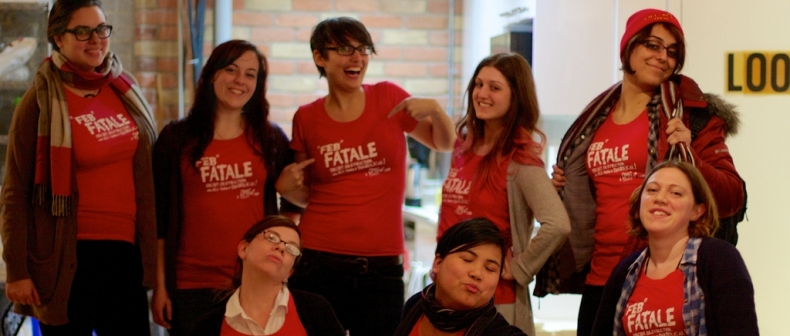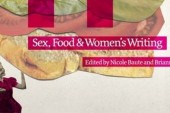
Toronto’s Dames Making Games, the city’s only women-oriented game creation organization, recently celebrated their one year anniversary at the end of last month. It’s been a year full of incubators, game jams, socials, and, of course, mentoring young women on how to make their own games. Dames Making Games was born out of TIFF Nexus’ 2011 program “The Difference Engine Initiative,” a six-week program with the Hand Eye Society that took young women who had never made games before and taught them how create them. Co-founder Cecily Carver was one of these participants and, even though there were no plans to continue the program after six weeks, she wanted to share the knowledge that she gained from it with other women. And so Dames Making Games was born.
In a world where “Fake Geek Girls” is a thing that people actually believe in, organizations like Dames Making Games are filling a very important void by offering more people, but especially women, the skills and opportunities to make games on their own. I had the pleasure of talking to two of the organization’s founders, Cecily Carver and Jennie Faber, about everything from the secrets to DMG’s success, sexism in the gaming community, and growing up gamer.
Did you always know that you wanted to make games?
Cecily Carver: I would say it’s not always something I thought I would be able to do. As a kid, I always really loved games, particularly adventure games. I played a lot of text adventures, and when I was pretty young I fiddled around with Basic a bit. I really wanted to make a game where you explore a castle, but I didn’t really understand the concept of an IF Statement, so I didn’t really get very far. I think all you could really do was walk up to the castle. I sort of put it out of my mind for a bit and, when I was a teenager and a young adult, I didn’t think as much about creating video games because I was playing them a lot. It was really only when the Difference Engine Initiative happened that it really occurred to me that a game was something I could make myself.
Jennie Faber: I played a lot of games when I was a kid, but it also never really occurred to me to make one. Well, I did kind of make games when I was young in QBasic, to make them more appealing for my little sister. She didn’t really like certain aspects of games like Gorillas or Nibbles, she wanted changes to them, and this is kind of how I sort of got interested in programming and that sort of stuff. Just digging into existing code and changing it to get the effects that I wanted. Modding, I guess.
What were some of your favourite video games when you were growing up?
CC: When I was little, my parents had a Commodore 64, and there was a bunch of games on that. Like, there was a Ghostbusters game, Ducks Ahoy. I remember there was a game called High Noon where you were a sheriff shooting bank robbers [Yeah, I think we had that one too!]. And then Nintendo entered the picture at some point, and I played Mario and all that. And then I got really into Final Fantasy VII when that was new. I think I played through that three or four times. I love all the BioWare RPGS. Baldur’s Gate I was a really big fan of. Grim Fandango, the Lucasarts adventure games, all that stuff.
JF: My favourite type of games growing up were the Sierra adventure games, especially King’s Quest VI. I played that one over and over, wrote the fanfic and everything.
CC: I didn’t know about the fanfic!
JF: I was a youngster, OK? [I have also written King’s Quest fanfic, so no judgment here] I tend to just glom onto one game and play it over and over, from as many different angles as I can.
CC: You’re not going to mention Mass Effect?
JF: Well yeah, I play a lot of Mass Effect, but that’s irrelevant. [laughs]
The gaming community isn’t always known to be accepting of feminist organizations stomping on their turf, so to speak. Have you found the Toronto gaming community to be very welcoming of DMG?
CC: I would say so. The Difference Engine Initiative got started here and that we got so much support for DMG following that, so it’s been a really exciting time to be running something like Dames Making Games. Sometimes people will tell me about negativity they’ve encountered in other quarters, but I kind of live in the DMG/Bento Miso cocoon, and I’ve never experienced any of it myself.
Have you ever thought about expanding Dames Making Games to cities other than Toronto?
CC: We’ve talked about it a few times, but we’ve decided that we really want to be a community-focused organization, and when we thought about expanding, we were like “well, it’s the people who are part of it who really make it what it is,” and we’re not sure how we could really benefit running something in another city where we couldn’t meet all the people who were involved and meet with them on a regular basis. There’s a group called the Pixelles in Montreal that’s sort of loosely related to Dames Making Games, but we decided we would rather support other groups that pop up as much as we can, and share resources and be a network– but we at Dames Making Games are going to be staying in Toronto.
Do you think that Toronto’s indie community has helped to make the organization possible?
CC: I think it would have been really difficult, and almost impossible, without the existing ecosystem that’s already here. Like Skot Deeming, who works with Vector and D-Pad, and the Hand Eye Society really laid the groundwork for DMG to be successful.
How many members do you currently have right now?
JF: Official members are around 60. But that doesn’t really represent the actual size of the community, I would say. We have a lot of people who tend our socials and other events, but aren’t necessarily paying members.
But despite the name, male members are welcome as well?
JF: Yes. I would say that probably about half our membership is men. We have two types of memberships, the Ally and the Dames, but it’s not really split on a gender binary. The Ally membership is people who are more experienced with making games and want to operate in the organization as mentors or volunteers, and the Dames level is more for people who are just starting out and maybe don’t know as much. So we don’t really have a gender split or anything, it’s more of an experience split.
No JamDMG runs workshops, the monthly speaker series, socials, and of course game jams. What exactly goes on at the socials, for people who have never been to one?
JF: The socials are the Speaker Socials and we have between three and five speakers every month. They share what they’ve been working on that’s related to games. So some of them are people who are working in the industry on a commercial level, some are artists, and some are more independent or hobbyists.
CC: All of them are women.
JF: Yes, all of them are women, and they have a range of different topics that they speak on. That’s followed by socializing, play testing games, and other people sharing work with each other.
So you have another game jam coming up next month. What is the theme, and what do people have to do to get involved?
JF: It’s a members only jam, so the first thing you have to do to get involved is be a member. The theme is “Mother, May I?” because it happens in the month of May, and Mother’s day is in May, but the theme is open to interpretation. That’s always something that’s very interesting to us, is seeing is how people interpret a theme.
CC: The theme is just the phrase, “Mother, May I?” and you could interpret that as being about mothers, or being about politely asking to do something, or about childhood. We’ll see what people come up with.
If someone wants to start making a game, or wants to participate in a game jam, are there any skills should they look to brush up on?
CC: I would say if they want to make a game, they should just start making a game. You can get one of the free gaming creation tools out there — GameMaker, Stencyl, or Game Salad. They’re all free, you can start playing around with them right away, and they come with example games that you can dig into and modify, as Jennie was saying earlier. That’s actually a really great place to start, taking an already existing game and changing it to make it more interesting or more appealing. Once you learn how other games work, you can start figuring what you want to do to make your own.
JF: I think it’s really important to emphasize that hard skills like programming and design aren’t even the most important skills for making a game. Patience and problem solving are much more important.
CC: Yeah, there’s definitely this attitude that says that to make a game first you have to learn programming, so you sign up for a programming course, and then you say, “OK, now I have to learn illustration,” so you go and learn illustration, and then once you’ve amassed all these skills you can apply yourself to making a game. But game making is really be more of a “learn as you go” kind of endeavor. It’s definitely a lot easier to pick up a skill like programming when you’re applying it to something like a making a game, because you can see your knowledge have an effect in your game.
JF: Yeah, that’s why our game jams and incubator programs are really good way to approach it, because you have to learn a broad range of skills in a short period of time, and you can’t really procrastinate or focus just on the programming for a year or whatever.
CC: You definitely don’t have to wait until you’ve reached a certain comfort level to get started.
A DMG Game Jam submission in progressWhat are some DMG game jam success stories?
JF: A lot of people are continuing to work on their games. We don’t see a lot of people who want to pursue the commercial side of things quite yet. Part of the reason for that is that we haven’t up until now offered a lot of resources or support for that. Currently we’ve been more focused on people who are just getting into making games for the first time, so a lot of it is that ramping up stage — working on gaining confidence and working in teams, and that sort of thing. But quite a few of the games we’ve seen come out of the jam are definitely set up to take advantage of the commercial side of things. One of them, Seven Sins, which came out of No Jam by Leisha Riddell, she’s continuing to work on it, and I think her intention is to eventually release it on iOS.
JF: Katie Foster, who is a member, is working on a game called The Disappearance of Emily Butler with the intention of taking it commercial eventually. One of our other members, Noreen Rana, has started her own studio, Blunderbuss Games, so that’s very exciting.
CC: At our very first incubator program, Jamuary, one of the participants, Kyra Kendall, made a game called Shop or Die, which is a platformer about shopping, but also about the ways that shopping kills you. She’s been working with a studio to make that into a commercial game, I think on Android and iOS.
What’s your favourite Toronto gamer hangout that’s not Dames Making Games?
CC: TOJam is really great, though Jennie is the TOJam veteran.
JF: I’ve only been to one, last year. Last year we worked offsite at Bento Miso because the registration was so full, but we wanted to give people an opportunity to still participate. Last year it was like 450 participants. It’s just a big, crazy, game making circus. This year I’m part of a team, Team Toytown, including one of our members, Maggie McLean, Eric Emery, who is one of our mentors, as well as my husband, Henry, and my partner at Bento Miso, Dan.
CC: The Hand Eye Socials are always fun, there was one a couple of months ago for Rogue-like games, which are a favourite of mine.
Dames Making Games’ April Speaker’s Social will be taking place on May 2nd. The “Mother, May I? “ Jam is on May 18th-19th. To register for either, or to become a member, check out the official site.
[CORRECTION: There were two separate groups of The Difference Engine Initiative in 2011, but after that there were no plans to hold more; “Visual Basic” has been changed to “Basic;” We also apologize for spelling Skot Deeming’s name incorrectly in the first version]
____
Megan Patterson is the Science and Technology Editor at feminist geekery site Paper Droids and currently a Toronto Standard intern. She also tweets more than is healthy or wise.
For more, follow us on Twitter at @torontostandard and subscribe to our Newsletter.














